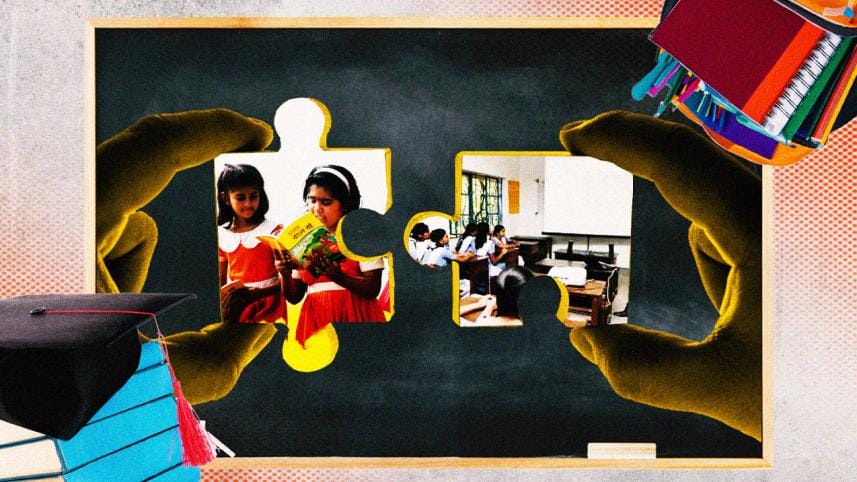The key changes needed in the education sector

We are living in a new Bangladesh where ideas really are bulletproof, thanks to the sacrifices—of lives, of sight, of comfort—made by countless students and general people in the July uprising, and to the sacrifices by the likes of Abrar Fahad and many others before that were made dreaming of such a revolution. In respect of their bravery and sacrifice, the rest of us must become louder in voicing ideas important for a discrimination-free, fair and passionate Bangladesh. In tribute to them, I will do what I have been trained to do, and outline what I think are the top priorities for our education sector in this rejuvenated and reform-promised Bangladesh.
Equity in primary education
If we imagine our education system as a pyramid, the wide base at the bottom would be the primary education level. The base needs to be strong, meaning that primary education should yield the required level of learning outcomes at each grade. Keeping in mind that different children face different realities and that privilege plays a strong role, the focus should be on providing quality primary education all across schools, madrasas, villages, and cities.
Equitable quality primary education would mean enabling students to read and write at the right level, regardless of their socioeconomic background. A decentralised equitable widespread distribution of resources is key in this case. Also, we must invest in research on primary education to find out what works in improving learning outcomes at the primary level. Raising the bar of primary education will, in turn, pull up the quality of secondary education as well.
Investment in educational research
If we want a reliable education system, there is no alternative to research-driven and evidence-based approaches. In this time of change and opportunity, researchers must get the chance to document the changes, the process of change, and both the perceived and actual consequences of any reforms. We have yet to know why our "srijonshil intervention" failed or what led to the change in the assessment system in the new curriculum. Process is important and this is where research becomes invaluable. Otherwise, anyone can take up a role and implement changes that they believe in—the lack of a system and the absence of institutionalisation allows room for this person-focused autonomy. No matter how knowledgeable a person may be, no national-level reform should be without a process.
Streamlined purpose of a university education
Contingent on being able to achieve equity in the primary-level learning outcomes, we may consider encouraging students to choose either the academic route or the Technical and Vocational Education and Training (TVET)/diploma route from the college level. The choice of a route may depend on the students' academic performance, personal ambition, or a combination of both. For this system to be implementable, we need to first strengthen primary education so that academic performance or ambition is not biased by privilege. Otherwise, we will end up with a faulty system where an underprivileged child, despite being academically talented, is forced to pursue the TVET or diploma route.
This is linked to a similar choice being offered at the university level. Those seeking a career in academia may choose the degree path, while others seeking different careers than academia, e.g., a civil service job, would pursue the diploma route.
Michael Spence's job market signalling model tells a story of how degrees have become signals for employers, so much so that large numbers of students enrol in universities for merely that: the degree. Consequently, students pursue a university degree to find jobs when in reality, perhaps a college graduate degree could have been adequate for most jobs.
Ideally, university—the academic route—shouldn't be for the masses. If we consider the purpose of the degree route to be the creation of a body of academics who will produce and reproduce knowledge, mass participation in university education defeats this purpose. Consider then, for example, that someone doesn't want to go into academia, but just wants to acquire the skills needed for a job with a decent salary. This is where we need the industry and job market to realign their intake criteria. It is time for them, across the board, to re-evaluate what they want in their workers.
Ideas inspired by collective experiences
Steps should be taken to include social and charity work into the curriculum. For example, a requirement of passing a grade could be that a student has to serve their community—plant trees, serve at an orphanage, control traffic, clean public places, etc. Additionally, a restructure of the Bangladesh Civil Service (BCS) recruitment process should be implemented to rethink how we measure merit in this country. Committees involved in scholarship (Commonwealth, for example) granting processes controlled by the University Grants Commission (UGC) and other such bodies should be rebuilt because there are strong grounds for questioning the presence of some of the members who have sat on these selection boards for years.
Finally, creating political awareness should be prioritised through education among eligible and future voters across rural and urban Bangladesh through extensive campaigning. This political awareness is crucial if we are to change the norms and narratives around whom we elect as our leaders, which is an important responsibility and can no longer be hereditary or bought with promises, favours or gifts. We need to actively nudge voting behaviour towards realistic manifestos, candidates' potential to implement plans, and their dedication and passion towards reforms in health, quality of life, and education. The new norm should be people before profit, not the other way around.
But all these ideas first need to be vetted through rigorous research and contextualised, decolonised analysis. The very first thing needed is to bring together a team of educational researchers—those with a track record of extensive research and training in the field—to brainstorm the future of education in Bangladesh.
Dr Rubaiya Murshed is an education economist and lecturer at the Department of Economics in the University of Dhaka.
Views expressed in this article are the authors' own.
Follow The Daily Star Opinion on Facebook for the latest opinions, commentaries and analyses by experts and professionals. To contribute your article or letter to The Daily Star Opinion, see our guidelines for submission.




 For all latest news, follow The Daily Star's Google News channel.
For all latest news, follow The Daily Star's Google News channel.
Comments